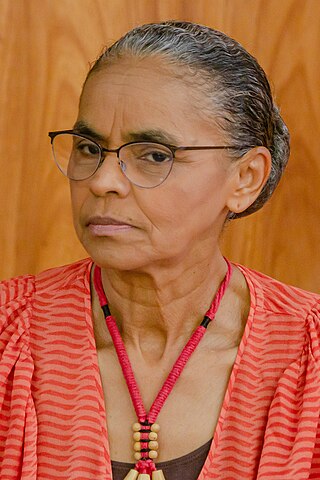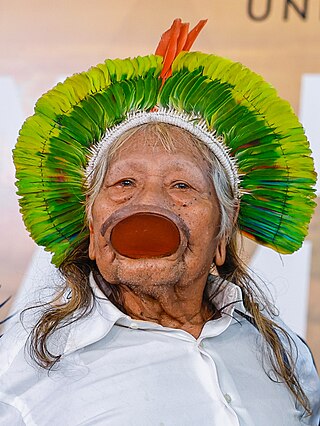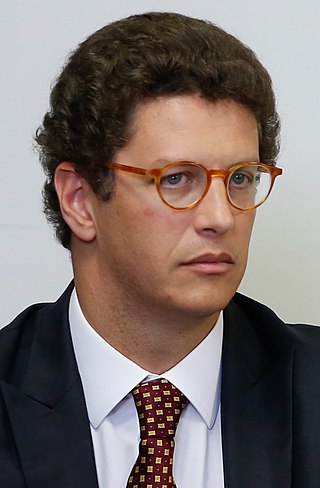
Luiz Inácio Lula da Silva, also known as Lula da Silva or simply Lula, is a Brazilian politician who is the 39th and current president of Brazil. A member of the Workers' Party, he previously served as the 35th president of Brazil from 2003 to 2010.

The Workers' Party is a centre-left to left-wing political party in Brazil that is currently the country's ruling party. Some scholars classify its ideology in the 21st century as social democracy, with the party shifting from a broadly socialist ideology in the 1990s. Founded in 1980, PT governed at the federal level in a coalition government with several other parties from 1 January 2003 to 31 August 2016. After the 2002 parliamentary election, PT became the largest party in the Chamber of Deputies and the largest in the Federal Senate for the first time. With the highest approval rating in the history of the country, President Luiz Inácio Lula da Silva is PT's most prominent member. Dilma Rousseff, also a member of PT, was elected twice but did not finish her second term due to her impeachment in 2016. The party came back to power with Lula's victory in the 2022 presidential election.

Brazilian history from 1985 to the present, also known as the Sixth Brazilian Republic or New Republic, is the contemporary epoch in the history of Brazil, beginning when civilian government was restored after a 21-year-long military dictatorship established after the 1964 coup d'état. The negotiated transition to democracy reached its climax with the indirect election of Tancredo Neves by Congress. Neves belonged to the Brazilian Democratic Movement Party (MDB), the former controlled opposition to the military regime. He was the first civilian president to be elected since 1964.

José Aldo Rebelo Figueiredo is a Brazilian politician and a federal deputy elected by the state of São Paulo. He was President of the Chamber of Deputies of Brazil from 2005 to 2007.

The Argentina–Brazil relationship is both close and historical, and encompasses the economy, trade, culture, education, and tourism. From war and rivalry to friendship and alliance, this complex relationship has spanned more than two centuries. The countries also share a system of government, a federal republic with a presidential system.

The environment of Brazil is characterized by high biodiversity with a population density that decreases away from the coast.

Brazil once had the highest deforestation rate in the world and in 2005 still had the largest area of forest removed annually. Since 1970, over 700,000 square kilometres (270,000 sq mi) of the Amazon rainforest have been destroyed. In 2001, the Amazon was approximately 5,400,000 square kilometres (2,100,000 sq mi), which is only 87% of the Amazon's original size. According to official data, about 729,000 km² have already been deforested in the Amazon biome, which corresponds to 17% of the total. 300,000 km² have been deforested in the last 20 years.

Maria Osmarina Marina da Silva Vaz de Lima, known as Marina Silva, is a Brazilian politician and environmentalist and current Brazil's Minister of the Environment and Climate Change. She is the founder and former spokeswoman for the Sustainability Network (REDE). During her political career, Silva served as a senator of the state of Acre between 1995 and 2011 and Minister of the Environment from 2003 to 2008. She ran for president in 2010, 2014 and 2018.

Fernando Haddad is a Brazilian scholar, lawyer and politician who has served as the Brazilian Minister of Finance since 1 January 2023. He was previously the mayor of São Paulo from 2013 to 2017 and the Brazilian minister of education from 2005 to 2012.

Raoni Metuktire, also known as Chief Raoni or Ropni, is an Indigenous Brazilian leader and environmentalist. He is a chief of the Kayapo people, a Brazilian Indigenous group from the plain lands of the Mato Grosso and Pará in Brazil, south of the Amazon River and along Xingu River and its tributaries. He is internationally famous as a living symbol of the fight for the preservation of the Amazon rainforest and indigenous culture.
Ana Tereza Palhares Basílio is a Brazilian judge and lawyer. She was appointed as the alternate judge of the Rio de Janeiro Regional Electoral Court by Brazilian president Dilma Rousseff.

The Social Democratic Party is a political party in Brazil led by Gilberto Kassab and uniting dissidents from various political parties, especially the Democrats, Brazilian Social Democracy Party and Party of National Mobilization.

Mauro Luiz Iecker Vieira is a Brazilian diplomat serving as Minister of Foreign Affairs of Brazil since 1 January 2023 under President Luiz Inácio Lula da Silva. Vieira occupied the same office between 2015 and 2016 during President Dilma Rousseff's second term.

In 2015 and 2016, a series of protests in Brazil denounced corruption and the government of President Dilma Rousseff, triggered by revelations that numerous politicians allegedly accepted bribes connected to contracts at state-owned energy company Petrobras between 2003 and 2010 and connected to the Workers' Party, while Rousseff chaired the company's board of directors. The first protests on 15 March 2015 numbered between one and nearly three million protesters against the scandal and the country's poor economic situation. In response, the government introduced anti-corruption legislation. A second day of major protesting occurred 12 April, with turnout, according to GloboNews, ranging from 696,000 to 1,500,000. On 16 August, protests took place in 200 cities in all 26 states of Brazil. Following allegations that Rousseff's predecessor, Luiz Inácio Lula da Silva, participated in money laundering and a prosecutor ordered his arrest, record numbers of Brazilians protested against the Rousseff government on 13 March 2016, with nearly 7 million citizens demonstrating.

Lulism is a political ideology describing the 2006 consolidation of segments of Brazilian society previously hostile to social movements and the Workers' Party behind political forces led by President Luiz Inácio Lula da Silva. The controlled reformism and limited structural change focused on the poorest sections of society. The lower classes, who had distanced themselves from Lula, accepted his candidacy after his first term as President as the middle class turned from him. The rhetoric and praxis which united the maintenance of stability and state distributism are the origins of Lulism. While advocating socialism, Lulism aims for a 'social liberal' approach that gradually resolves the gap between the rich and the poor in a market-oriented way.
The Manicoré Biological Reserve is a biological reserve in the state of Amazonas, Brazil. It fully protects an intact area of the Amazon rainforest that is rich in biodiversity, and serves as part of a shield against the advance of the arc of deforestation.
The Aripuanã National Forest is a national forest in the state of Amazonas, Brazil. It supports sustainable forestry, and also protects the environment, supports scientific research and protects the sustainable lifestyle of the traditional inhabitants of the forest.

Sônia Bone de Souza Silva Santos, usually known as Sônia Guajajara, is a Brazilian indigenous activist, environmentalist, and politician. A member of the Socialism and Liberty Party (PSOL), she was initially a candidate for President of Brazil in the 2018 Brazilian general election, before being chosen as the vice presidential running mate of nominee Guilherme Boulos. This made her the first indigenous person to run for a federal executive position in Brazil. In 2022, Guajajara was named one of the 100 most influential people in the world by Time.

Ricardo de Aquino Salles is a Brazilian politician who has served as Minister of the Environment from 1 January 2019 to 23 June 2021, under President Jair Bolsonaro.

Brazil–Norway relations are the diplomatic relations between the Federative Republic of Brazil and the Kingdom of Norway. Both nations are members of the United Nations.















